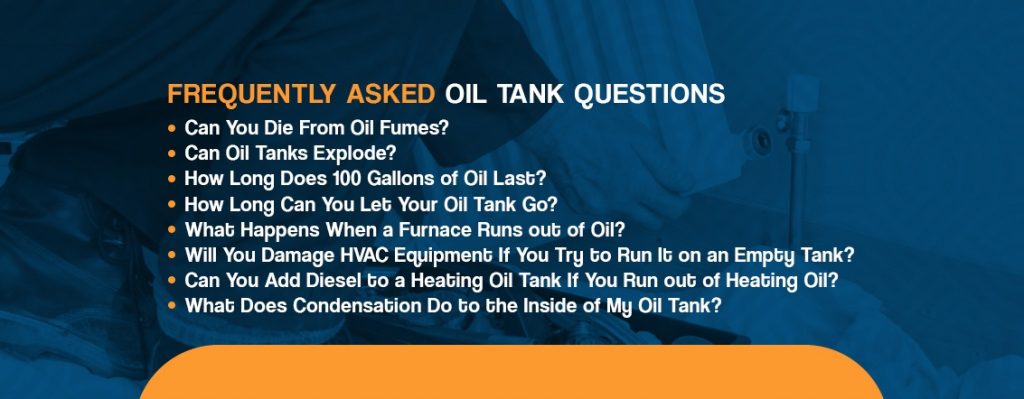Dangers Of An Empty Oil Tank
If you suddenly find your oil tank has gotten low, make sure you refill it as quickly as possible. This is because an empty oil tank can cause some serious problems, both to the tank itself and to your home heating system. We are here to answer all your questions about your home heating oil tank and what can happen if your oil supply runs out.
What Happens If an Oil Tank Is Empty?
What happens if your heating oil tank runs out of oil? Is it dangerous for an oil tank to be empty or just inconvenient? The answer is both. There are several issues you can run into when you let your oil supply run out. The results of an empty oil tank include:
- Major inconvenience: First, running out of oil can mean running out of heating, which can be a major inconvenience. Imagine having to wait on a refill to heat your home or have access to hot water in the middle of winter.
- Clogged filters: Another problem that can result from an empty tank is clogged filters. When oil filters become clogged with debris, your heating system can become inefficient or can fail completely.
- Damage to HVAC equipment: When sediment or impurities are sucked into the feed line and are not kept out by filters, it could potentially damage your HVAC equipment.
- Condensation in the tank: Another issue that can occur in an empty oil tank is water collecting in the tank. This can lead to rust inside your tank and can cause your heating system to fail.
Frequently Asked Oil Tank Questions
Now that we have covered the basics, let’s look at some common questions homeowners have about their oil storage tanks.

Inhaling fumes from heating oil can cause some problems in the short-term, such as nausea, dizziness and headaches. Heating oil is NOT toxic enough to kill someone who breathes in the fumes. That said, long-term exposure to oil fumes can lead to some serious health problems such as kidney and liver damage.
When it comes to home heating oil, explosions are not an issue. These types of oil tanks are very safe. In fact, heating oil will not even burn if you were to try to light it on fire. The oil must be heated and turned to vapor before it becomes flammable.
The answer to this question depends on how much demand your household places on heating oil. To provide a reference point, the average American household that uses heating oil as their primary space-heating fuel goes through around 500 gallons of heating oil from the beginning of October to the end of March. If your household is similar to the average, then you can expect 100 gallons of oil to last less than a month during the cold months.
The answer to this question depends on how much oil you are using. You do not want to let your oil get too low, so you need to check regularly when you are going through a lot of oil to see when it is time to add more oil. In the Northeast, you may go through around five gallons of oil per day during the winter. If you are not using it up, the oil sitting in your tank should last around 18 to 24 months, as long as it contains additives.
Your furnace should be equipped with a mechanism that shuts off the oil burner when there is no oil coming in. So, as long as your furnace is functioning correctly, it should not be permanently damaged by running out of oil.
In some cases, yes. Running out of oil means the water and sediment in the bottom of the tank can get sucked into lines, causing clogs. Water and sediment can also damage your HVAC equipment itself.
Yes, you can rely on diesel fuel if you start to get low on heating oil and cannot get a refill soon enough. While diesel fuel oil is a good solution in a pinch, you’re better off to request an emergency oil delivery or schedule your deliveries to come more frequently in the future.
The less fuel that is in your tank, the more room there is for condensation during the heat of the summer months. When this moisture forms, it settles to the bottom of your tank and causes the bottom of your tank to rust. Over time, this will cause the metal to deteriorate, posing a potential threat of leaking oil.
Can Condensation in an Oil Tank Damage Heating Equipment?
- Complete breakdown of your heating system
- Erratic or unpredictable operation of your heating system
- Blocking and erosion of burner tips and mechanical parts
- Loss of heat release
By their nature, oil tanks allow a collection of water, sediment and sludge to build in a tank over its lifespan. If your tank is properly maintained, you can reduce the amount of water, sediment and sludge to extend the life of your oil tank and heating equipment.
How Do I Prevent Damage to My Heating Oil Tank During the Summer?
So, how can you prevent damage to your oil tank from low oil levels and increased condensation? Filling your heating oil tank right before summer starts leaves very little room for condensation to form inside your tank and can help prevent the inside of your tank from rusting.
Periodic inspections of your heating equipment and oil tank can also help detect any issues before they become major problems or an oil leak occurs. If your tank is 15 years old or older, a tank replacement would be in your best interest to prevent oil leaks and damage to your heating equipment. Our expert team of energy consultants can come to your home to provide a free consultation and estimate and help you choose the right tank for your home.
Emergency Heating Oil and Fuel Delivery From SMO Energy
The best way to prevent the problems we have discussed is to have reliable delivery services to keep your oil tank full. If you live in Southern Maryland and you are running low on oil and need an emergency heating oil or fuel delivery, SMO Energy is here to help. We offer a 24/7 delivery service, allowing us to deliver the same day or the next day, so you can avoid being stuck in the cold or seeing your tank and HVAC equipment suffer damage.
We are one of the region’s leading providers of heating oil and other types of fuel delivery and HVAC services, and we are committed to meeting all our customers’ needs. With many decades of experience, transparent pricing and convenient delivery options, SMO Energy is the ideal partner to keep your home heated and your oil tank full. Call us at 1-888-222-3720 or contact us online today.
